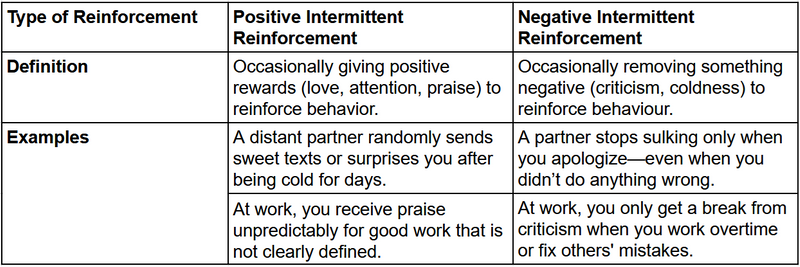Have you ever been in a friendship or relationship that had strange patterns of affection or attention?
Has anyone ever said something to make you feel confused or anxious?
 Have you ever been made to feel less confident and in need of the other person’s approval?
Have you ever been made to feel less confident and in need of the other person’s approval?
If so, you may be experiencing the negative effects of intermittent reinforcement.
What is Intermittent Reinforcement?
Intermittent reinforcement means giving rewards or positive feedback to other people only sometimes and at unpredictable times.

Instead of giving a reward every time someone does something, it’s given only now and again, or after they do it a few times.

This approach can be very effective as it can help or force people to keep doing the behavior longer, and often makes them pay more attention than if they were rewarded every time.

 Map created by the author with Google Docs. To hear an audio description of the map, click play on the audio player below:
Map created by the author with Google Docs. To hear an audio description of the map, click play on the audio player below:
Negative Effects of Intermittent Reinforcement
The negative effects of intermittent reinforcement can cause significant psychological effects, as the unpredictability of rewards can create a cycle of hope and despair in others, making it difficult for people to break free from abusive relationships.
 Photo by Towfiqu barbhuiya on Unsplash
Photo by Towfiqu barbhuiya on UnsplashScenario Example
Anna has been in her relationship for 4 years, and is finding it difficult to leave her emotionally abusive partner. She is repeatedly drawn back to her partner when they withdraw their love and attention, only for them to return unpredictably with affection. Anna blames herself for her partner’s moods and fears abandonment.
Emotional Rollercoaster
Scenario: Jamie & Taylor
Jamie and Taylor have been dating for a year, but one of them gives attention or affection unpredictably. Some days, Taylor is incredibly affectionate. Other days, she becomes distant without explanation.
When Jamie tries to talk to her about it, she accuses Jamie of being “too needy.” The inconsistency of this affection makes Jamie emotionally dependent and anxious, making him more invested.

What’s Happening Here:
The unpredictability of intermittent reinforcement keeps Jamie emotionally off balance, making him feel unsure where he stands. The emotional highs and lows, similar to a rollercoaster or addiction cycles, make Jamie more invested in maintaining the relationship even when it becomes harmful.

Things to Look Out For:
You feel anxious waiting for a partner’s response.
You often blame yourself for their mood swings.
You feel a strong “high” during good moments, but they’re short-lived.
You walk on eggshells to avoid triggering distance or criticism.
You keep hoping for the “old version” of them to come back.

Next Steps:
Understanding what is happening is the first step toward breaking free from intermittent reinforcement. Recognize that the inconsistent affection isn't your fault, so try to set boundaries for what behaviors you won’t tolerate. Seek support by talking to a trusted friend or therapist who can offer an outside perspective.
Increased Obsession or Preoccupation
Scenario: Your Friend's Texts
A friend you know replies to your texts or WhatsApp messages sporadically — sometimes immediately, sometimes hours later, sometimes even days later. This uncertainty can make you check your phone more and become more fixated on their responses.

You may spend much time thinking about the other person, analyzing their behavior, or trying to get their approval. As a result, you become emotionally and mentally consumed by the relationship. This can leave you neglecting your own needs.
What’s Happening Here:
You might start to over-invest emotionally in the friendship because of intermittent reinforcement. Because the responses from your friend are unpredictable and inconsistent,youcan become obsessed with thinking about what the next reply will mean.

Things to Look Out For:
Constantly checking your phone or social media for signs of attention.
Canceling or avoiding plans in case they reach out.
Feeling relief with each reply, but dread when there’s silence.
Neglecting personal needs like sleep, food, or rest.

Next Steps:
Try to ask yourself how much you're putting your own needs on hold. Set times when not to use the phone, especially before bed. Re-engage with friends, hobbies, or routines that you enjoy.
Self-Doubt and Insecurity
Scenario: Ethan's Parents
Ethan is 18 and has just started his first full-time job. At the start, his parents were very pleased and congratulated him. But after a few weeks, his parents' attitude changes, and they tell him that his job is nothing special.
 Photo by Jack Sharp on Unsplash
Photo by Jack Sharp on UnsplashBecause of his parents' inconsistent attitude, one minute praising his accomplishments, then ignoring or criticizing, Ethan starts questioning his worth. Ethan finds himself constantly second-guessing and doubting himself.
What’s Happening Here:
The inconsistency coming from intermittent reinforcement sends mixed messages to Ethan, making it hard for him to trust his own emotions. At his age, it's important to receive support from his parents. Without support, he can start to develop low self-confidence.

Things to Look Out For:
Inconsistent praise and criticism keep people hooked on seeking approval.
People pleasing at the expense of personal health.
Being overly sensitive to praise or criticism
Seeking external applause to get validation and acknowledgement.

Next Steps:
A first step is to acknowledge that your sense of value may be dependent on praise. You could look for a therapist who focuses on cognitive behavioral therapy (CBT) to help challenge distorted beliefs like “I’m only good if others say so."
Difficulty Leaving a Relationship
Scenario: Hannah's New Relationship
At the beginning of her new relationship, Hannah was overwhelmed with constant affection and attention from her new partner, but then her partner withdrew. Eventually, her partner returned to being loving and attentive, but it was not the same as when her partner love bombed her at the start.
 Hannah knew that the relationship was unhealthy, but felt too stuck to leave it, as the intermittent rewards kept her hopeful and emotionally invested. She hoped that the "good version" of her partner would return, even if the overall experience was painful. She began to question if she had done something to push her partner away.
Hannah knew that the relationship was unhealthy, but felt too stuck to leave it, as the intermittent rewards kept her hopeful and emotionally invested. She hoped that the "good version" of her partner would return, even if the overall experience was painful. She began to question if she had done something to push her partner away.
 What’s Happening Here:
What’s Happening Here:
In this form of intermittent reinforcement, the hope of reward keeps Hannah emotionally hooked, even when she knows the relationship is unhealthy. It's difficult for her to reconcile the loving version of her partner with the emotionally unavailable one. The continuous unpredictability shakes Hannah's emotions.
Things to Look Out For:
Being in denial that the "good version" of the other person will return.
Increased dependence on the other person, despite feeling unhappy.
Hoping for the intense highs to return.
Self-doubt making you unable to leave the relationship.
Quiz
What should Hannah's next steps be in the relationship?
Take Action

If you feel that you, a friend, a family member, or someone else you know is in a negative relationship because of intermittent reinforcement, you could:
Your feedback matters to us.
This Byte helped me better understand the topic.
